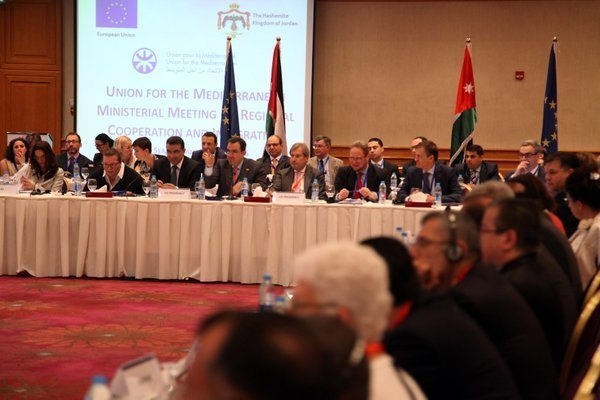
New dynamics for regional cooperation in the Mediterranean
Dead Sea (Jordan), 2 June 2016. EU Commissioner Johannes Hahn and Imad N. Fakhoury, Jordanian Minister of Cooperation and Planning, had jointly invited to this first Union for the Mediterranean Ministerial Meeting for Regional Cooperation and Planning.
Minister Fakhoury, co-president of the meeting, declared that ‘the Euro-Mediterranean region faces increasing common challenges. Win-win regional cooperation is an essential complement to virtually any policies we pursue at national levels. Therefore, we have agreed to step up efforts to operationalise regional priorities, in particular by addressing them more actively in each country’s planning activities and in the coordination of cooperation funded by different partners. The two sides of the Mediterranean are in need for deeper economic integration based on a win-win approach that supports global efforts for regional peace, stabilization, reconstruction and economic integration.’
He added that the success of this meeting was built on the encouraging achievements in specific sectorial cooperation in the past years (UfM Ministerial Meetings took place on various sectors such as Water, Employment and Labour, Trade, Women, Urban Development, Transport, Energy, Industrial Cooperation, Blue Economy, Environment and Climate Change and Digital Economy).
Commissioner Hahn underlined the opportunities held by regional cooperation and integration to increase economic growth and job creation in the Mediterranean region, and outlined the support that the recently revised European Neighbourhood Policy offers to this. ‘The EU is fully committed to the development partnership with this region, and will help implement the vision of a region that collaborates, is integrated and inter-connected, while delivering on national specific priorities. Our most important challenge today is to find ways for the young men and women in our region to see a meaningful future; a sense of belonging to a local and global community where they can offer and get rewards for their individual skills. We need to send them the message that we see the future of this region as one of cooperation and exchange. ‘
“This first UfM Ministerial Meeting on Regional Cooperation and Planning is setting a stronger regional cooperation framework for tangible initiatives and projects in the Mediterranean”, said the Secretary General of the Union for the Mediterranean, Fathallah Sijilmassi. “We are here today to reinforce the regional dimension and the collaborative approach of our common cooperation efforts to foster human development and job creation especially for our youth, which is the main asset for the future and stability of our region. We need to place young people at the core of regional cooperation efforts to make them active players of the region’s socio-economic future”, he added.
The EU is strongly committed to seeing progress in regional cooperation and integration, as reflected in the revised European Neighbourhood Policy (ENP). Following the ministerial meeting, several emblematic initiatives were launched: the EU initiatives for financial inclusion, with a worth of €150 million access to finance for new entrepreneurs in the region; the Civil Society Fellowship Programme with the first 20 young civil society leaders meeting with Commissioner Hahn at the Dead Sea; and a €90 million renewable energy programme with Jordan, demonstrating how bilateral and regional efforts and policy agendas can meet and be mutually supportive.
Ministers recognised the need to boost economic integration among the countries in the region as one of the means to create opportunities for the necessary inclusive growth and job creation. They highlighted the crucial role of the Union for the Mediterranean to that effect, welcoming the work of the UfM Secretariat to help facilitate progress in regional cooperation and integration, including by promoting region-wide projects: 45 projects have been labelled as of today by UfM Member States, of which 22 are already under implementation on the ground.
At the informal UfM Ministerial Conference in Barcelona, last 26 November, Ministers of Foreign Affairs of the UfM Member States and their representatives unanimously expressed their common commitment to work together on a deepened and operational regional cooperation, within the framework of the Union for the Mediterranean. Today’s was the first formal UfM meeting at Ministerial level since the EU revised its policy towards its neighbouring countries in November 2015, and the first ever focused on the financial dimension of regional cooperation. Bringing together all strands of cooperation for results: from words to action on the ground.


